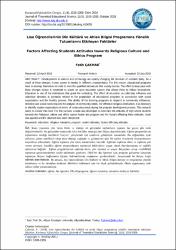Lise öğrencilerinin din kültürü ve ahlak bilgisi programına yönelik tutumlarını etkileyen faktörler
Künye
Çakmak, Fatih; 2018 AKU, Kuramsal Eğitimbilim Dergisi - Journal of Theoretical Educational Science, 11(4), 1019-1069Özet
İnsan yaşamına yön veren bilim ve tekniğe ait gelişmeler toplumların yapısını her geçen gün hızla değiştirmektedir. Bu gelişmeler sonucunda farklı özellikte insan gücüne ihtiyaç duyulmaktadır. Eğitim programları da toplumların istediği nitelikteki bireyleri yetiştirmek için kendisini geliştirmek zorundadır. Bu değişimlere ayak uydurma çabası yenilikleri takip etme olanağı sağlayan ve gelişmelere açık bir eğitim sisteminin oluşturulmasını kaçınılmaz kılmaktadır. Eğitim topluma yön veren kurumlardan birisidir. Eğitimin topluma etkisi ve topluma yön verme derecesi, öncelikle eğitim programlarının toplumsal beklentilere uygun olarak hazırlanmasına ve sağlıklı işlemesine bağlıdır. Eğitim programlarının topluma etkisi, yön vermesi ve sosyal ihtiyaçlara cevap verebilmesi toplumun gereksinimlerinin analiz edilmesini gerektirir. Etkili bir din öğretimi için, program geliştirme sürecinde toplumun ihtiyacı bağlamında öğrenci beklentilerinin saptanması gerekmektedir. Araştırmada bu ihtiyaç tespit edilmek istenmektedir. Bu amaçla, lise öğrencilerinin Din Kültürü ve Ahlak Bilgisi dersine ve programına yönelik tutumlarını ve bu tutumları etkileyen faktörleri belirlemek için bir ölçek geliştirilmiştir. Ölçek uygulanmış, elde edilen veriler yorumlanmıştır. Developments in science and technology are rapidly changing the structure of societies daily. As a result of these changes, human power is needed in different characteristics. For this reason, educational programs have to develop themselves in order to train the qualified individuals that society desires. The effort to keep pace with these changes makes it inevitable to create an open education system that allows them to follow innovations. Education is one of the institutions that guide the collecting. The effect of education on collecting influence and collective direction is primarily related to the preparation of educational programs in accordance with social expectations and the healthy process. The ability of the training programs to respond to community influences, direction and social needs requires the analysis of community needs. For effective religious instruction, it is necessary to identify student expectations in terms of community needs during the program development process. This research wants to answer this need. For this purpose, a scale was developed to determine the attitudes of high school students towards the Religious culture and ethics course lesson and program and the factors affecting these attitudes. Scale was applied and the obtained data were interpreted.



















